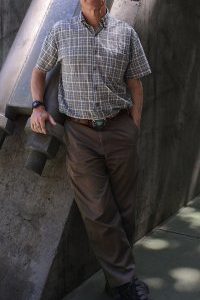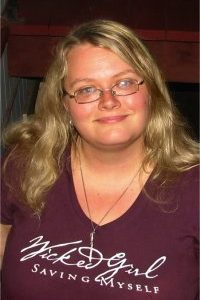Gareth L. Powell: Big Universe

GARETH LYN POWELL was born September 3, 1970 in Clifton, Bristol, England; he grew up in Bristol, and lives there still. He studied humanities and creative writing at the University of Glamorgan (later merged with University of Wales, Newport and renamed the University of South Wales) and was fortunate to count Diana Wynne Jones and Helen Dunmore as early mentors. He has taught creative writing at various universities in the UK and US, and he worked in software marketing before turning to writing more seriously in 2008. He married writer Jendia Gammon in 2022.
Powell began publishing SF with “Morning Star” in 2004, and many of his stories appeared in Interzone, including Interzone Readers Poll winner “Ack-Ack Macaque” (2008). Other notable short works include British Science Fiction Association Award finalists “Ride the Blue Horse” (2015), Ragged Alice (2019), and Light Chaser (2021) co-written with Peter F. Hamilton. Some of his stories have been collected in The Last Reef (2008) and Entropic Angel and Other Stories (2017). He has also published poetry and essays, and his non-fiction guide About Writing appeared in 2019.
His debut novel Silversands came out in 2010, followed by The Recollection in 2011. BSFA Award winner Ack-Ack Macaque (2012) launched an alt-history SF series that continued with Hive Monkey (2013) and Macaque Attack (2014). BSFA Award winner Embers of War (2018) launched a space opera trilogy that also includes Fleet of Knives (2019) and Light of Impossible Stars (2020). The Continuance series consists of Stars and Bones (2022) and Descendant Machine (2023). Standalone SF novel Future’s Edge will be published in late February 2025, and other titles are in the works, including short fiction collection Who Will You Save? in September 2025 and standalone novel Jitterbug in February 2026.
In 2024, Powell & Gammon launched independent press Stars and Sabers Publishing. Their first publication, cross-genre anthology Of Shadows, Stars, and Sabers, is out later this month.
Excerpt from the interview:
“When I finished the Embers of War trilogy, which was very well received and very well reviewed, I thought, ‘Oh, what do I do for an encore?’ That pressure was petrifying. When you write a series of three books, you know who the characters are and what the next book is going to be. Then suddenly the series is done, and you’re starting again from scratch. So, I talked to my publisher Titan, and their idea was instead of writing another trilogy to instead do a series of books that were standalones but set in a common universe, like Iain Banks’s Culture series, so that readers could onboard anywhere. (That’s a horrible word, but yeah.)
“I thought that might keep things fresh. If I was telling single-book-length stories, I’d have the advantage of writing standalones, but also the advantage of having a precreated world in which to set them. That appealed to me a great deal. So I came up with this scenario and the outline for the first book, which was Stars and Bones. The basic situation is that a few years from now, there’s a nuclear war on Earth. Except while the missiles are in the air, a physicist operating in a tiny little lab in Oxford accidentally invents hyperspace travel, which draws the attention of these benevolent aliens who’ve been observing the Earth. They weren’t going to step in and do anything, but suddenly they think, ‘Maybe humanity is a species of interest.’ They intervene and stop all the missiles, but they also kick the humans off the Earth and say, ‘You are not fit to be in charge of a biosphere.’ They set us adrift in a thousand arks to wander the universe. Seventy-five years later, humanity is adjusting to this. Each different ark has its own culture, and people have moved between arks and gravitated together. You have these thousand different cultures flying around, organized in ways that range from throwback capitalism to post-scarcity. Because the arks provide everything they need, it’s essentially a post-scarcity situation, but some people like the old way of doing things. It’s not a single human fleet – it’s a complex, squabbling group of a thousand ships.
“Ahead of this group are these small scout ships known as the Vanguard, who travel ahead and check out systems in the path of the fleet, for scientific reasons and also to scout for danger. One of them discovers a crashed spaceship, and the crew all gets horribly murdered by something within. The sister of one of those murdered crew members sets out to investigate what happened. It’s very much a horror novel that I tried to skew in the direction of John Carpenter’s The Thing and Ridley Scott’s Alien – I really wanted to get into a sci-fi horror vibe with that one.
“Although I started writing it in 2019, when I got to the point where the various arks are quarantining themselves to try and stop this intelligent virus from infecting them, we went into COVID lockdown. It all felt a bit too close to home suddenly. I struggled during the lockdowns with trying to write a book about a sentient virus attacking humanity. You know, I went to an absolute ton of conventions before the plague. I did loads of European conventions and so on. But the last two conventions I’ve been to, Eastercon and the Worldcon in Glasgow, I got nasty doses of COVID from both of those, so I’m feeling more wary of conventions than I was before. I’ve had it three times, and it’s not done me any favors. But it’s better than the time I had whooping cough at the London Worldcon in 2014 – I didn’t even know that whooping cough was still a thing. (I found out after having it that even though I was vaccinated for it, the vaccine only lasts 12 years, so you need to top up.)
“I was very pleased with how Stars and Bones turned out, though. It’s got the horror, but it’s also got relatable characters as with the Embers series. It’s still a recognizable Gareth L. Powell book, even though I’ve tried to up the horror on it.
“The sequel, Descendant Machine, is set 50 years later, with a whole different cast of characters, and isn’t quite so horror skewed. It’s more a giant mystery where there’s this enormous planet-sized machine. Nobody quite knows what’s inside it, but a race of aliens want to start it up because they think it will bring them prosperity and advantage, and everyone else thinks it will blow up the entire galaxy. There’s a huge race to find this holy man from this alien race, who’s the only person who knows how it works and what’s inside.
“So far this series is a duology. If I think of another story in that universe, I might go back to it at some point. I’ve left it open for that. There are other stories that could be told there, but at the same time, I have other stories in other universes that I want to write.
“I hold all the worldbuilding in my head, and I make it up as I go along. There’s a character in Descendant Machine from an alien race, and he’s called Allergic-to-Seafood. I just made up off the cuff that every member of his species is named after their greatest weakness. I think there’s one called Dependent-on-Alcohol and another one called Drowning-Phobia. There’s one called Never-Fully-Committed. I made that entire species up when I got to the point where the characters needed to meet some aliens. With worldbuilding, a little goes a long way. It’s something I learned from the first Star Wars movie in 1977, when Luke is at Ben Kenobi’s house. Kenobi says, ‘I want to tell you about your father. He fought in the Clone Wars.’ And the Clone Wars are never explained in that movie! Luke just goes, ‘Wow, the Clone Wars.’ But for all of us in 1977, we were like – the Clone Wars, what the hell were they? That makes the universe feel much bigger. It was all much more interesting because it was like these characters were actually living in a real world, because they didn’t need to explain everything. They could just say things, and people understood. If we’re writing contemporary fantasy, and the character gets in a car, they just turn the key and go. They don’t spend 40 pages discussing the history of OPEC and the oil crisis. So if we’re writing about hyperspace travel, I treat it the same way. They get in and they go. I want it to feel like the real world, where there’s all this other stuff in the background that makes it feel bigger.
“I wrote the first third of Descendant Machine, and then somehow, and still to this day I have no idea how, it vanished completely off my computer. I hadn’t deleted it, because it wasn’t in the deleted files. I used three different recovery software packages to trawl my hard drive, and it was just completely gone. There was no sign of it. I have no idea how that could possibly have happened. So I uttered a mighty swear word and lay on my couch and thought, ‘This is it. I’m done. I’ll never write again. How can I possibly restart from scratch when I’m like a third of the way into a novel? It’s impossible. I’ll just go and run away into the forest and become a squirrel or something.’ But I did come back to it. I had a lot of encouragement from my wife. As I started rewriting it, bits of it came back, but there were also bits of it I didn’t want. I actually started with a few different characters than the ones I’d initially had and a slightly different plot. The book is really a lot better for starting over. On one hand, it was the worst moment of my professional life, but on the other hand, it actually turned out to be a blessing in disguise –- albeit a very heavy disguise.
Interview design by Francesca Myman
Read the full interview in the February 2025 issue of Locus.
 While you are here, please take a moment to support Locus with a one-time or recurring donation. We rely on reader donations to keep the magazine and site going, and would like to keep the site paywall free, but WE NEED YOUR FINANCIAL SUPPORT to continue quality coverage of the science fiction and fantasy field.
While you are here, please take a moment to support Locus with a one-time or recurring donation. We rely on reader donations to keep the magazine and site going, and would like to keep the site paywall free, but WE NEED YOUR FINANCIAL SUPPORT to continue quality coverage of the science fiction and fantasy field.
©Locus Magazine. Copyrighted material may not be republished without permission of LSFF.







